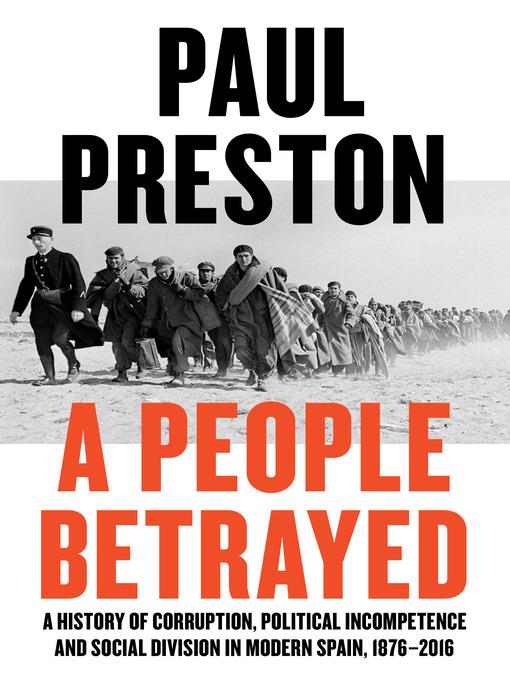
A People Betrayed
A History of Corruption, Political Incompetence and Social Division in Modern Spain
کتاب های مرتبط
- اطلاعات
- نقد و بررسی
- دیدگاه کاربران
نقد و بررسی

April 1, 2020
One of the leading authorities on 20th-century Spain paints a dark portrait of the political history of the Iberian nation that has long struggled to find solid government and leadership. Preston, a professor at the London School of Economics who has written many books on the history, politics, and culture of modern Spain, barely hides his anger at the failures of Spain's major figures over the past two centuries. "Violence, corruption and incompetence of the political class have betrayed the population since 1833 and almost certainly before," he writes near the beginning. He continues, "unlike, say, France or Italy after 1871, Spanish governments failed to create an all-embracing sense of nationhood." Opening this authoritative yet searingly critical narrative with the restoration of the Bourbon monarchy in 1874, Preston takes us smoothly through the ruinous Spanish-American War, the Spanish Civil War and its long, repressive Francoist aftermath, and the country's transformation into a republic since the 1970s. The author, a discerning critic of a country he clearly understands, delivers a comprehensive, vivid, and bleak record of assassinations, betrayals, anarchist attacks, extrajudicial exterminations, military coups, terrorism, dictatorship, endless corruption, and economic ruin. Even the post-Franco return of representative government and democracy within a monarchy has been "painful," the republic's young life a mixture of "grandeur and misery." Preston leaves readers pessimistic about the ability of Spain's current regime to lead the country into a bright future, and the author's unrelenting disappointment with the country he loves is sometimes taxing to readers. The book could have used some lighter-hued relief with more focus on Spain's ordinary people, who have always gotten on with their lives despite officialdom's poisonous struggles for power. In the book's welter of detail about politics and culture, the achievements of average Spaniards often get lost. Still, the scope of the narrative and the obvious depth of research are impressive. Likely to be the go-to history of modern Spain for many years to come. (20 b/w illustrations)
COPYRIGHT(2020) Kirkus Reviews, ALL RIGHTS RESERVED.

Starred review from April 27, 2020
Fascist dictators, left-wing terrorists, and feckless democratic politicians all come off badly in this nuanced and evenhanded history of modern Spain. London School of Economics historian Preston (The Last Days of the Spanish Republic) roots Spain’s violent 20th century in deep sociopolitical dysfunctions, including exploitation of impoverished peasants and workers by a reactionary elite of landowners, industrialists, the Catholic Church, and the military, who cemented their power through electoral fraud; outrageous political corruption; and a left-wing opposition given to bomb throwing. These issues persisted through the 1936–1939 civil war—Preston blames the Loyalist government’s defeat in part on left-wing factionalism and Prime Minister Largo Caballero’s lethargy—and Francisco Franco’s dictatorship. Things looked up, in Preston’s telling, during the mid–1970s, when political moderates and King Juan Carlos (who bravely faced down a 1981 coup attempt) engineered the transition to democracy. But Basque separatist terrorism and a perpetual whirlwind of corruption scandals, according to Preston, have tarnished even Juan Carlos. Preston brings this complex story alive with brisk, lucid prose and colorful character sketches, and treats Spain’s rancorous political antagonisms judiciously. This vigorous narrative history delivers sharp insight into Spain’s chaotic past.

Starred review from July 1, 2020
Preston (history, London Sch. of Economics; The Spanish Holocaust) is the foremost historian of modern Spain writing in English. This latest work continues Preston's pattern of producing definitive studies of 20th-century Spain. Citing more than a hundred pages of sources, this massive volume paints a pessimistic picture of Spain's historically stagnant economy, venial and incompetent politicians, reactionary military and clergy, regional separatist movements, and relentless boom-and-bust cycles of revolution and reaction that blunted progress for more than a century. Spain began transitioning to democracy after far-right dictator Francisco Franco died in 1975, but the country is still beset by old ills, including rampant corruption and a burgeoning Catalan independence movement. Spain has seen an astonishing number of military coups: 50 from 1814 to 1981. It has withstood crisis after crisis: humiliation in the Spanish-American War (1898), Miguel Primo de Rivera's kleptocratic regime (1923-30), civil war (1936-39) and ensuing decades of dictatorship, and an uphill struggle for democracy (1975-present). Betrayed by their leaders time and again, the Spanish people have nevertheless sustained a rich, robust culture. VERDICT A definitive political history of modern Spain: searing, sympathetic, analytical, and packed with enough intrigues and regime changes to excite scholars and history buffs alike.--Michael Rodriguez, Univ. of Connecticut, Storrs
Copyright 2020 Library Journal, LLC Used with permission.

























دیدگاه کاربران